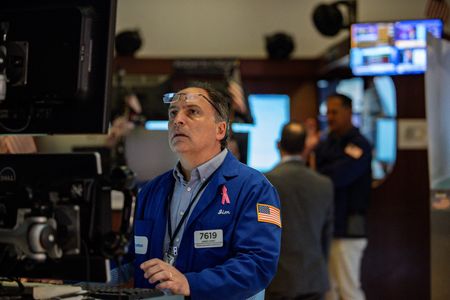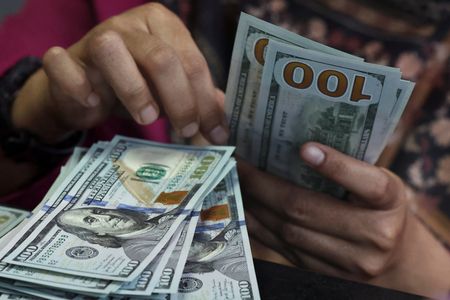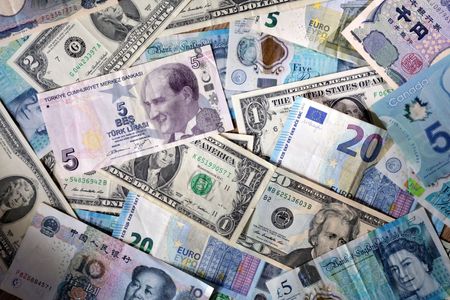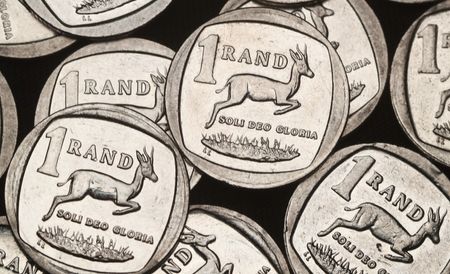By Sinéad Carew and Nell Mackenzie
NEW YORK/LONDON (Reuters) -MSCI’s global equity index edged up on Monday and longer U.S. Treasury yields ticked higher as the latest U.S. tariff threats kept investors on edge while they waited for inflation readings and the start of earnings season later in the week.
The euro briefly hit an almost three-week low while the dollar index held steady after U.S. President Donald Trump’s weekend threat to impose a 30% tariff on imports from the European Union and Mexico from August 1.
Trump said he was open to discussions, while the European Union accused the U.S. of resisting efforts to strike a trade deal and warned of countermeasures if no agreement is reached.
Meanwhile, the U.S. earnings season is set to begin on Tuesday, with second-quarter reports from major banks. S&P 500 profits are expected to rise 5.8% year-over-year, according to LSEG data. The outlook has dimmed sharply since the early April forecast of 10.2% growth, before Trump launched his trade war.
“It’s all about earnings season now. People are not sure what it’s going to hold. They want to be optimistic. Usually earnings season pans out better than expected,” said Robert Pavlik, senior portfolio manager at Dakota Wealth in Fairfield, Connecticut, while noting that valuations are “a bit expensive relative to the five-year average.”
“That, on top of the most recent tariff announcements, has people sort of just waiting on the sidelines,” said Pavlik.
On Wall Street, the Dow Jones Industrial Average rose 88.14 points, or 0.20%, to 44,459.65, the S&P 500 rose 8.81 points, or 0.14%, to 6,268.56 and the Nasdaq Composite rose 54.80 points, or 0.27%, to 20,640.33.
MSCI’s gauge of stocks across the globe rose 0.90 points, or 0.10%, to 923.46.
Earlier, the pan-European STOXX 600 index ended off 0.06%, above its session lows.
PRESSURING POWELL
Trading in long-dated U.S. Treasuries was choppy, with yields touching multiweek peaks as investors weighed the prospect of an exit by Federal Reserve Chairman Jerome Powell.
While Powell has indicated a patient stance on interest rate policy until the impact of tariffs is clearer, Trump has been pushing for aggressive easing. Trump said on Sunday that it would be great if Powell stepped down.
White House economic adviser Kevin Hassett warned that Trump might have grounds to fire Powell because of renovation cost overruns at the Fed’s Washington headquarters.
The yield on benchmark U.S. 10-year notes rose 1.2 basis points to 4.435% while the 30-year bond yield rose 2.1 basis points to 4.9781%.
The 2-year note yield, which typically moves in step with interest rate expectations for the Federal Reserve, fell 1.2 basis points to 3.902%, from 3.914% late on Friday.
Besides earnings season, investors are also waiting for U.S. consumer price data for June, due on Tuesday, and will monitor for any upward pressure on prices from tariffs.
They will also watch for any tariff impact to supply-chain costs in producer price and import price figures also due this week, along with a view of consumer health in retail sales data.
Bitcoin gained 0.71% to $119,970.25 after earlier crossing the $120,000 level for the first time. The largest cryptocurrency extended its gains this year to about 30% on optimism over upcoming U.S. House discussions on digital asset regulation.
In currencies, traders largely shrugged off new tariffs ahead of the inflation data.
“It’s something that’s happened before and the shock value is gone,” Joseph Trevisani, senior analyst at FX Street, said regarding tariffs. At the same time, “the negative predictions haven’t come to pass so I don’t think you’re going to get too much more emphasis for the markets out of tariffs.”
The euro was down 0.19% against the dollar at $1.1667 while against the Japanese yen, the dollar strengthened 0.23% to 147.74.
The Mexican peso weakened 0.44% versus the dollar, with Mexican President Claudia Sheinbaum on Monday hitting back at U.S. criticism that her government was not doing enough to combat fentanyl trafficking. She called for the U.S. to do more to arrest drug traffickers on its own turf and stop the flow of weapons south across the border.
Sterling weakened 0.55% to $1.3425 after Bank of England Governor Andrew Bailey said uncertainty is weighing on growth expectations, in a letter to G20 finance ministers and central bank governors, urging vigilance against the risk of disruptive market moves.
Oil prices settled down more than $1 as investors worried about U.S. trade policy and weighed Trump’s threat that buyers of Russian oil would face sanctions unless Russia agrees to a peace deal. However, the treat came with a 50-day grace period.
U.S. crude settled down 2.15% or $1.47 at $66.98 a barrel and Brent finished at $69.21 per barrel, down 1.63%, or $1.15.
Gold prices eased after hitting a three-week peak on Monday with attention on trade talks and upcoming U.S. economic data, while silver pared gains after hitting its highest level since 2011.
Spot gold fell 0.34% to $3,344.09 an ounce. U.S. gold futures fell 0.15% to $3,351.00 an ounce.
(Reporting by Sinéad Carew, Karen Brettell in New York, Nell Mackenzie in London and Wayne Cole in Sydney; Editing by Christopher Cushing, Sharon Singleton, Alison Williams, Matthew Lewis and Lincoln Feast.)










